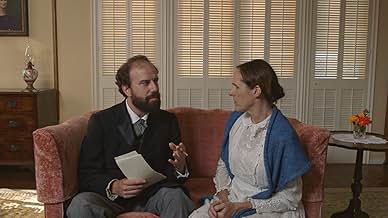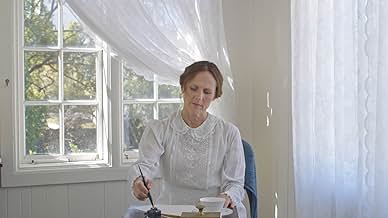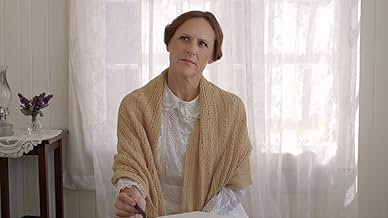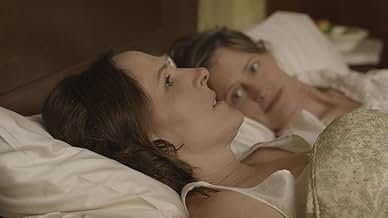VALUTAZIONE IMDb
6,2/10
1509
LA TUA VALUTAZIONE
Drammatizzazione del lato poco conosciuto della vita della scrittrice Emily Dickinson, in particolare della sua relazione con un'altra donna.Drammatizzazione del lato poco conosciuto della vita della scrittrice Emily Dickinson, in particolare della sua relazione con un'altra donna.Drammatizzazione del lato poco conosciuto della vita della scrittrice Emily Dickinson, in particolare della sua relazione con un'altra donna.
- Regia
- Sceneggiatura
- Star
- Premi
- 3 vittorie e 7 candidature totali
Stella Chesnut
- Mattie Dickinson
- (as Stella Chestnut)
John Peña Griswold
- Young Austin
- (as John Griswold)
Recensioni in evidenza
Wild Nights With Emily (2018)
It was like an episode of 'Drunk History' (2013-9).
An awful Americanised period comedy, like a hammed up version of 'Murdoch Mysteries' (2008-) which has always been crazy cheesey anyway.
The timeline jumped all over the place and Molly Shannon showed the diversity that she has always had, that is to say, none.
It was based on the Writer/Directors one woman show and I think that there was too much comedy stage show left in it and not enough time spent converting it to a suitable format for film.
I couldn't get further than the first advert break, because it was just dull, patronising and silly all at the same time. I've seen better, more informative things from the five minute skits on 'Morecambe & Wise'. They were actually funny too!
Unscored as unfinished.
It was like an episode of 'Drunk History' (2013-9).
An awful Americanised period comedy, like a hammed up version of 'Murdoch Mysteries' (2008-) which has always been crazy cheesey anyway.
The timeline jumped all over the place and Molly Shannon showed the diversity that she has always had, that is to say, none.
It was based on the Writer/Directors one woman show and I think that there was too much comedy stage show left in it and not enough time spent converting it to a suitable format for film.
I couldn't get further than the first advert break, because it was just dull, patronising and silly all at the same time. I've seen better, more informative things from the five minute skits on 'Morecambe & Wise'. They were actually funny too!
Unscored as unfinished.
"Wild Nights with Emily" is a biopic of the poet Emily Dickinson, based around what might be called a revisionist account of her life. The film starts from the assumption that traditional literary scholarship has tended to portray Dickinson, wrongly, as a shy, reclusive, virginal spinster whose poems were inspired by unrequited love for men. Its express purpose seems to be to correct this mistaken impression, showing her as a woman who enjoyed many friendships with other women and who had a long-lasting lesbian relationship with her friend Susan Gilbert.
According to this thesis Susan also became her sister-in-law, entering into a lavender marriage with Emily's brother Austin in order to have closer and easier access to Emily herself. (Austin and Susan had children together, so perhaps their marriage might not have been as lavender as the film makes out). The idea of Emily as a shy virgin apparently originated with her first editor, Mabel Todd, who also happened to be Austin Dickinson's mistress, and who after Emily's death expunged all mention of other women- especially Susan- from her work. Mabel's motive was partly to make the poems less shocking, and therefore more saleable in the puritanical climate of late nineteenth-century America, but she may also have been motivated by a dislike of Susan, her rival for Austin's love.
I decided to watch the film when it recently turned up on British television, but unfortunately it does not work very well as a biography. The action tends to jump about between three periods- 1840, when Emily, here portrayed as a beautiful teenager, is falling in love with Susan, the early 1860s, when she is starting to develop as a poet, and the 1890s, after Emily's death when Mabel is campaigning to establish her reputation as a major literary figure. The abrupt switches from one period to another could make the action difficult to follow at times. The timeline does not always accord with the facts of Dickinson's life; in 1840 she would still have been a young child, and in the middle period, when she would only have been in her early thirties, she is portrayed as a rather plain middle-aged woman. I felt that Molly Shannon, 54 at the time, was miscast in the leading role which should have gone to a younger actress.
"Wild Nights with Emily" is the sort of title which you might associate with softcore porn, but the film is not actually pornographic; the nature of the relationship between Emily and Susan is made clear, but there are no explicit sex scenes. The jokiness of the title is not, however, inappropriate, because the film is in many ways a comedy, treating much of Dickinson's life-story in a light-hearted way, even though, from what I have read of her poetry, she seems to have been a rather serious-minded individual. The male characters, in particular are treated as figures of fun, especially an elderly judge who treats us to a summary of that well-known Bronte sisters novel "Wuthering Jane". (He has confused the plot of "Wuthering Heights" with that of "Jane Eyre"). Emily's mentor Thomas Wentworth Higginson, in real life a noted advocate of the rights of women, is here portrayed as comically sexist, treating Emily with patronising condescension.
The film-makers do just enough to persuade me that Emily Dickinson's life, and her relationship with Susan Gilbert, could have been the subject of an interesting film. Unfortunately, what they have made isn't that film. Director Madeleine Olnek said that it was important to include comedy because "some people don't like to be lectured about feminism". She ought to realise that taking your subject-matter seriously is not the same as lecturing people. 4/10.
According to this thesis Susan also became her sister-in-law, entering into a lavender marriage with Emily's brother Austin in order to have closer and easier access to Emily herself. (Austin and Susan had children together, so perhaps their marriage might not have been as lavender as the film makes out). The idea of Emily as a shy virgin apparently originated with her first editor, Mabel Todd, who also happened to be Austin Dickinson's mistress, and who after Emily's death expunged all mention of other women- especially Susan- from her work. Mabel's motive was partly to make the poems less shocking, and therefore more saleable in the puritanical climate of late nineteenth-century America, but she may also have been motivated by a dislike of Susan, her rival for Austin's love.
I decided to watch the film when it recently turned up on British television, but unfortunately it does not work very well as a biography. The action tends to jump about between three periods- 1840, when Emily, here portrayed as a beautiful teenager, is falling in love with Susan, the early 1860s, when she is starting to develop as a poet, and the 1890s, after Emily's death when Mabel is campaigning to establish her reputation as a major literary figure. The abrupt switches from one period to another could make the action difficult to follow at times. The timeline does not always accord with the facts of Dickinson's life; in 1840 she would still have been a young child, and in the middle period, when she would only have been in her early thirties, she is portrayed as a rather plain middle-aged woman. I felt that Molly Shannon, 54 at the time, was miscast in the leading role which should have gone to a younger actress.
"Wild Nights with Emily" is the sort of title which you might associate with softcore porn, but the film is not actually pornographic; the nature of the relationship between Emily and Susan is made clear, but there are no explicit sex scenes. The jokiness of the title is not, however, inappropriate, because the film is in many ways a comedy, treating much of Dickinson's life-story in a light-hearted way, even though, from what I have read of her poetry, she seems to have been a rather serious-minded individual. The male characters, in particular are treated as figures of fun, especially an elderly judge who treats us to a summary of that well-known Bronte sisters novel "Wuthering Jane". (He has confused the plot of "Wuthering Heights" with that of "Jane Eyre"). Emily's mentor Thomas Wentworth Higginson, in real life a noted advocate of the rights of women, is here portrayed as comically sexist, treating Emily with patronising condescension.
The film-makers do just enough to persuade me that Emily Dickinson's life, and her relationship with Susan Gilbert, could have been the subject of an interesting film. Unfortunately, what they have made isn't that film. Director Madeleine Olnek said that it was important to include comedy because "some people don't like to be lectured about feminism". She ought to realise that taking your subject-matter seriously is not the same as lecturing people. 4/10.
Wild Nights with Emily (2018) was written and directed by Madeleine Olnek.
It stars Molly Shannon as Emily Dickinson and Susan Ziegler as her sister-in-law, Susan Gilbert Dickinson.
The story comes to us in flashback, as narrated by Mabel Todd, portrayed by Amy Seimetz. Mabel lectures to women's groups, discussing Emily's poems and suggesting to them that Dickinson had a lesbian relationship with Susan.
It's clear that Mabel is a scheming opportunist. However, it's considered highly possible--in the movie and in real life--that Todd is correct.
The plot of the movie revolves almost entirely around the relationship of Emily and Susan. The film works because the actors are so good at presenting us with women in whom you can believe. It's wonderful to see two extremely talented actors bring their characters to life. (In her supporting role, Amy Seimetz does an excellent acting job as well.)
We saw this movie as in the Little Theatre as part of Rochester's ImageOut, the LGBT Film Festival. It will work well on the small screen.
The movie has a fairly weak IMDb rating of 7.0. However, it has been rated by less than 100 people, so it could still climb to a better position. I liked the film and highly recommend it.
It stars Molly Shannon as Emily Dickinson and Susan Ziegler as her sister-in-law, Susan Gilbert Dickinson.
The story comes to us in flashback, as narrated by Mabel Todd, portrayed by Amy Seimetz. Mabel lectures to women's groups, discussing Emily's poems and suggesting to them that Dickinson had a lesbian relationship with Susan.
It's clear that Mabel is a scheming opportunist. However, it's considered highly possible--in the movie and in real life--that Todd is correct.
The plot of the movie revolves almost entirely around the relationship of Emily and Susan. The film works because the actors are so good at presenting us with women in whom you can believe. It's wonderful to see two extremely talented actors bring their characters to life. (In her supporting role, Amy Seimetz does an excellent acting job as well.)
We saw this movie as in the Little Theatre as part of Rochester's ImageOut, the LGBT Film Festival. It will work well on the small screen.
The movie has a fairly weak IMDb rating of 7.0. However, it has been rated by less than 100 people, so it could still climb to a better position. I liked the film and highly recommend it.
After watching this irreverent yet sincere tribute to poet Emily Dickinson, I had the urge to revisit Julie Harris in "The Belle of Amherst". Call me Old School, but I vastly prefer serious filmmaking to the facetiousness of this feature-length SNL sketch approach.
Certainly SNL alumna Molly Shannon as Emily and Susan Ziegler as her sister-in-law, who share the love that dare not say its name in this version of the Dickinsons story give amusing and often moving performances, but the film has no consistent style or tone, and the male characters are predictably straw men mocked for the self-centered Male Superiority attitudes. Even the movie's unreliable narrator, Mabel (Emily's posthumous editor), well-played by Amy Seimetz, is written with such a heavy hand by filmmaker Madeleine Olnek as to lose substance.
Set in 3 different time frames: 1860 for the main story, 1840 for the young Emily and Susan played by disconcertingly lovely actresses Dana Melanie and Sasha Frolova, and Mabel's current era after Emily's death, wherein she pontificates to packed audiences inflating her role in championing Dickinson's career, the movie unfolds in disconnected scenes, many of which might easily have been dropped for sheer dullness, and a couple of which (surreal in nature) clash with the matter-of-fact overall style. Unlike the usual exaggerated beauty of period movies, typified by everything from Merchant-Ivory classics to Kubrick's "Barry Lyndon", Olnek presents the show as if in a low-budget amateur dress-up production representing 2019.
Use of poetry on screen in subtitles as it is recited (and sometimes by itself) recalls Jim Jarmusch's recent use of same in "Paterson", a techinque I found artificial and forced, just as it seems here too.
Certainly SNL alumna Molly Shannon as Emily and Susan Ziegler as her sister-in-law, who share the love that dare not say its name in this version of the Dickinsons story give amusing and often moving performances, but the film has no consistent style or tone, and the male characters are predictably straw men mocked for the self-centered Male Superiority attitudes. Even the movie's unreliable narrator, Mabel (Emily's posthumous editor), well-played by Amy Seimetz, is written with such a heavy hand by filmmaker Madeleine Olnek as to lose substance.
Set in 3 different time frames: 1860 for the main story, 1840 for the young Emily and Susan played by disconcertingly lovely actresses Dana Melanie and Sasha Frolova, and Mabel's current era after Emily's death, wherein she pontificates to packed audiences inflating her role in championing Dickinson's career, the movie unfolds in disconnected scenes, many of which might easily have been dropped for sheer dullness, and a couple of which (surreal in nature) clash with the matter-of-fact overall style. Unlike the usual exaggerated beauty of period movies, typified by everything from Merchant-Ivory classics to Kubrick's "Barry Lyndon", Olnek presents the show as if in a low-budget amateur dress-up production representing 2019.
Use of poetry on screen in subtitles as it is recited (and sometimes by itself) recalls Jim Jarmusch's recent use of same in "Paterson", a techinque I found artificial and forced, just as it seems here too.
If you're looking for a serious historical drama featuring stories from the life of Emily Dickinson, this is not your movie.
Instead, this is an ideal movie for those who love Emily and want to both laugh at some silly/comical interactions and learn about a side of Emily not as commonly known.
It plays a little like an episode of Drunk History, so go in with that expectation. If you accept it as that, you will walk away with a real appreciation for Molly Shannon's talent and a new appreciation for Emily Dickinson.
Instead, this is an ideal movie for those who love Emily and want to both laugh at some silly/comical interactions and learn about a side of Emily not as commonly known.
It plays a little like an episode of Drunk History, so go in with that expectation. If you accept it as that, you will walk away with a real appreciation for Molly Shannon's talent and a new appreciation for Emily Dickinson.
Lo sapevi?
- QuizOriginally performed as a play by the film's director, who extensively researched with support from Harvard University Press and the Guggenheim Foundation.
- BlooperAfter Susan brings the newspaper to show Emily her published poem, she (sarcastically) wishes Emily a Happy Valentine's Day as she exits. In the next shot, a tree with full foliage can be seen out the window. There are definitely no leaves on the trees in Amherst, Massachusetts in mid-February.
- ConnessioniFeatured in MsMojo: Top 10 Best LGBTQ+ Romantic Comedies (2021)
I più visti
Accedi per valutare e creare un elenco di titoli salvati per ottenere consigli personalizzati
Dettagli
- Data di uscita
- Paese di origine
- Siti ufficiali
- Lingua
- Celebre anche come
- Wild Nights with Emily
- Luoghi delle riprese
- Aziende produttrici
- Vedi altri crediti dell’azienda su IMDbPro
Botteghino
- Lordo Stati Uniti e Canada
- 519.487 USD
- Fine settimana di apertura Stati Uniti e Canada
- 30.209 USD
- 14 apr 2019
- Lordo in tutto il mondo
- 523.982 USD
- Tempo di esecuzione
- 1h 24min(84 min)
- Colore
- Mix di suoni
- Proporzioni
- 1.78 : 1
Contribuisci a questa pagina
Suggerisci una modifica o aggiungi i contenuti mancanti

















